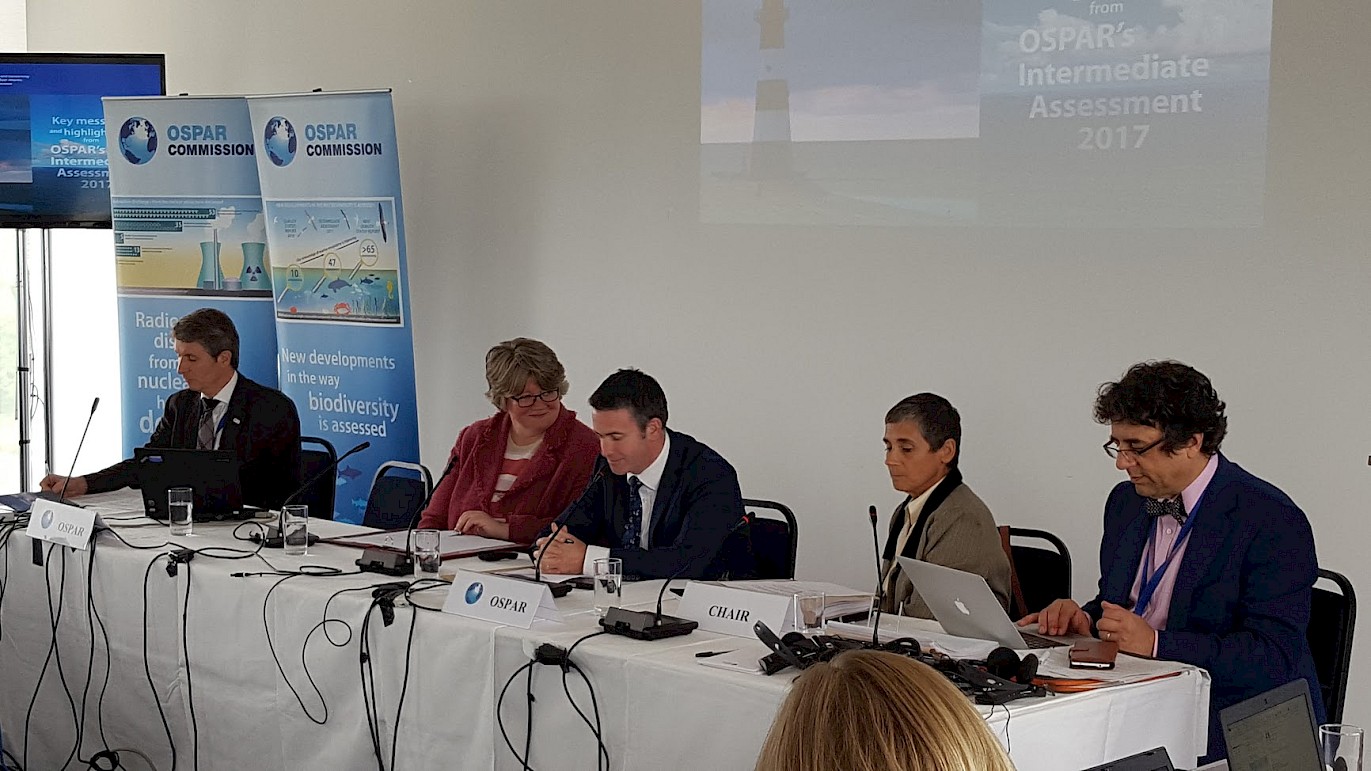New assessment of marine species and pollution in the North-East Atlantic
The 2017 meeting of the OSPAR Convention for the Protection and Conservation of the North-East Atlantic, co-hosted by Ireland and the UK, engaged key international environmental policy makers. The meeting saw the finalisation and launch of OSPAR’s Intermediate Assessment 2017, assessing the health of marine species and levels of pollution, such as marine litter and contaminants, across the North-East Atlantic.
The results of the assessment will be used to judge progress towards OSPAR’s vision of a clean, healthy and biologically diverse North-East Atlantic Ocean. The Intermediate Assessment 2017 demonstrates that OSPAR is successfully addressing pollution from hazardous and radioactive substances, eutrophication, and discharges from the offshore oil and gas industry, and that there is a need to continuing to develop measures to protect vulnerable species and habitats.
However, the Intermediate Assessment 2017 also shows that there are still challenges ahead in areas such as the completion of a well-managed network of Marine Protected Areas as well as newer threats, such as marine litter, which have emerged since OSPAR’s inception 25 years ago. The report also highlights the plight of many marine bird species for which numbers have continued to fall since OSPAR’s 2010 assessment.
The Irish Minister of State for Housing and Urban Renewal, Damien English, and Minister Thérèse Coffey M.P. - UK, Under Secretary of State at the Department for Environment Food and Rural Affairs – opened the meeting which was held in Cork, Ireland.
Minister Coffey said “I can confidently say that our 25-year history of cooperation has given us plenty to be proud of. The Intermediate Assessment gives a useful insight into the progress the convention has made. Having seen this product, which brings together findings on 47 different measures covering all aspects of the marine environment including contaminants, litter, species and habitats and the impacts of human activities, it really paints a clear and accessible picture on the changing status of the North-East Atlantic. The health of our oceans and seas is intrinsically linked to the health of our people and economies. I see Regional Seas Conventions, of which OSPAR is the exemplar, continuing to lead the way in the delivery of a truly sustainable approach to our shared oceans”.
Minister English said “Prestigious Events such as this OSPAR meeting provide a great opportunity to develop a common understanding of issues of mutual concern, to share experiences and knowledge, and to develop ways to best work together to protect and sustainably manage our shared marine environment. We, as current custodians of the marine environment, have a duty and a responsibility to pass on a marine resource to future generations, a rich and abundant legacy to be sustainably developed and enjoyed by our children and their children”.
OSPAR Countires would also be calling on the EU to introduce legal measures to achieve a 100% phasing out of microplastic particles in personal care and cosmetic products, in line with Action 47 of the OSPAR Regional Action Plan on Marine Litter.
 The Irish Minister of State for Housing and Urban Renewal, Damien English, and Minister Thérèse Coffey M.P. - UK, Under Secretary of State at the Department for Environment Food and Rural Affairs – opened the meeting which was held in Cork, Ireland
The Irish Minister of State for Housing and Urban Renewal, Damien English, and Minister Thérèse Coffey M.P. - UK, Under Secretary of State at the Department for Environment Food and Rural Affairs – opened the meeting which was held in Cork, Ireland
Follow us on twitter @osparcomm
ENDS
NOTES TO THE EDITOR
OSPAR (Oslo-Paris) Commission
- The OSPAR Commission was set up by the 1992 OSPAR Convention for the Protection of the Marine Environment of the North-East Atlantic, which unified and updated the 1972 Oslo and 1974 Paris Conventions. It brings together the governments of Belgium, Denmark, Finland, France, Germany, Iceland, Ireland, Luxembourg, the Netherlands, Norway, Portugal, Spain, Sweden, Switzerland and the United Kingdom, together with the European Community.
- The main output from this year’s Meeting will be the publication of an intermediate assessment of the environmental status of the north East Atlantic www.ospar.org/assessments.
- More than 60 international non-governmental organisations and inter-governmental organisations are involved in OSPAR as official Observers. They represent a broad range of interests and expertise related to the marine environment and the uses of marine resources (www.ospar.org/observers ).
- OSPAR’s Regional Action Plan on Marine Litter (www.ospar.org/documents?v=34422 ) focusses on the development of regionally coordinated actions to reduce the impacts from marine litter, monitoring and assessment; and strengthening cooperation with other relevant regional and international organisations and industry.
- The main work areas covered by the Convention are; Hazardous substances and eutrophication, Offshore oil and gas industry, Radioactive substances, Biological diversity, Environmental impacts of human activities.
- The OSPAR Commission is the forum through which Contracting Parties cooperate. It normally meets once a year, usually at the end of June. The annual meeting is hosted by one of the Contracting Parties. The Commission is supported by five main committees dealing with OSPAR work areas, some of which are in turn supported by working groups. In addition, the Heads of the Delegations of the Contracting Parties meet regularly to prepare the meetings of the Commission, to advise on management and to oversee the development and implementation of the agreements made by the Commission. The Commission is also supported by meetings of the Group of Jurists and Linguists and the Committee of Chairmen and Vice-Chairmen.
- Because of the trans-boundary nature of marine pollution, it is considered best to address marine environmental issues at regional seas level and OSPAR consists of EU and non-EU members in the North East Atlantic.
- The OSPAR Maritime Area is divided into 5 Regions
